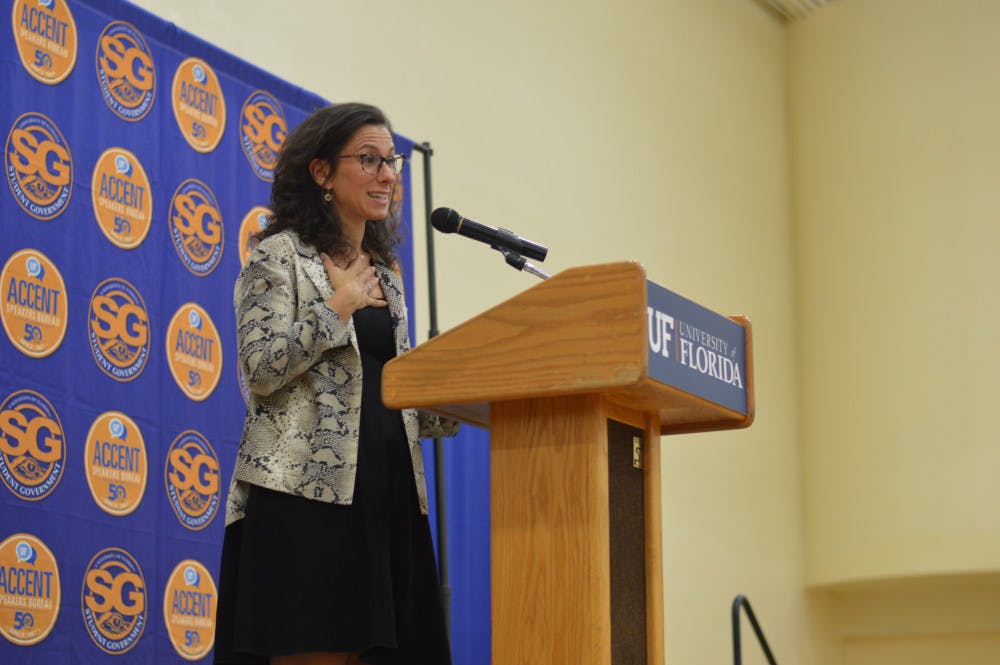Jodi Kantor, a Pulitzer-prize-winning reporter for The New York Times and one of the two reporters who broke the story that Harvey Weinstein was paying off sexual harassment accusers, was kicked off her college newspaper in the late ‘90s, she candidly told her student audience at UF.
“It’s kind of a cliché with these speeches to start by saying, ‘Well, I took a really unlikely path to be with you here tonight,’” she joked at the start of her speech. “But in my case, it is actually true.”
For about an hour Wednesday evening, 43-year-old Kantor spoke to about 70 students in the Florida Gym as part of Accent Speakers Bureau’s last event of the semester. She was paid $20,000 for speaking, according to Alligator archives.
For the first 40 minutes, Kantor spoke about her job — on everything from covering the Obama White House to what eventually led her to cover women’s unheard voices.
After about seven years of covering the Obamas, Kantor said it was an email from a woman named Sasha who lived in Vermont that led her to her true passion in journalism: uncovering the often unheard stories of women.
Sasha was inspired by a story Kantor wrote in 2006 about the lack of accommodations for hourly paid women who need to lactate and breastfeed their children. Since reading the article, Sasha wrote she had been intent on solving the issue for nearly seven years.
“This totally floored me in a way that meant more to me than all of the TV show invitations and all of the kind of glamor and headlines of covering Washington, D.C., and the presidency,” Kantor said. “They had actually been inspired to take action through our journalism.”
A week and a half after winning a Pulitzer Prize for her role in the Weinstein investigation, Kantor said the “magic” of journalism was how the rest of the world then responded to the work. In her case, it was the #MeToo movement.
“So many women all over the world said, ‘I recognize that pattern,’” Kantor said. ‘“You got it right. Here’s my story.’”
The last 20 minutes was a Q&A session with the audience.
Mackenzie Behm, who over Summer interned at Babe.net, the publication that in January ran the controversial story on Aziz Ansari’s personal sexual encounter with a date, asked Kantor about where reporters should draw the lines of what sexual assault stories they report.
Kantor said lines should be drawn in national conversation between workplace sexual harassment cases like Weinstein versus cases like the Ansari story that are much more difficult to classify.
“I think there was some controversy about whether (the Ansari) story was a sexual assault or not,” Kantor said. “This is one of the challenges of doing this kind of journalism, because words matter.”
In an interview after the event, Behm, a 20-year-old UF journalism sophomore, said she was happy to see a journalist of such high stature speak on the differences between Ansari and Weinstein.
Behm feels all instances of influential figures’ sexual misconduct should be reported in some capacity.
“We, as a society, look up to them so much,” she said. “I think it’s important, even if it’s a little weird, like, ‘Oh what are they doing in the bedroom?’ to know what these people are doing because they have so much power.”
Award-winning journalist and author Jodi Kantor spoke to students Wednesday night in the Florida Gym as part of Accent Speaker Bureau's final event of the semester. The New York Times investigative reporter was recently awarded the Pulitzer Prize for her story uncovering Harvey Weinstein's sexual abuse in the entertainment industry as well as being named one of TIME Magazine's 100 most influential people of 2018.





